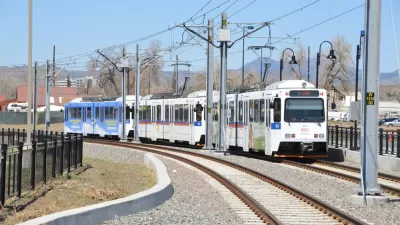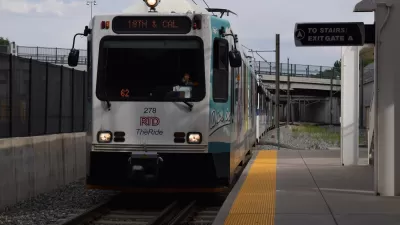The agency released a draft plan to eliminate regional zones, make airport trips more affordable, and reduce fares systemwide.

The Denver area Regional Transportation District (RTD) has unveiled a new draft plan for lowering fares, eliminating regional zones, and reducing the cost of monthly passes, reports Jon Murray in the Denver Post. The plan is based on the results of an “intensive systemwide study” undertaken by RTD in 2021. “The study’s mandate was to simplify RTD’s fare structure and reduce riders’ costs, which are at the upper end among U.S. transit agencies, especially for longer trips.”
Murray details the proposed changes, including lowering local fares and day pass fees, eliminating the regional fare, and reducing the cost of a monthly pass to $88, which would also include trips to the airport. The plan also suggests making fares free for youth under 19, increasing the low-income discount to 50 percent, and expanding its eligibility.
According to Murray, “More changes are possible, and RTD in the coming months will perform a federally required equity analysis to comply with civil rights laws.” The RTD board will vote on a final version in July, with new fares taking effect in early 2024.
The agency says it can afford the changes, since only 8 percent of operating expenses are covered by fare revenue, down from almost 16 percent before the Covid-19 pandemic. “The agency’s board briefing document projects that under the recommended fare and pass changes, revenue would drop next year to $73.5 million from $78.5 million, depending on whether the board approves a zero-fare youth pass pilot,” but ridership is expected to increase by 8 to 14 percent.
See the source article for more details on the proposed changes.
FULL STORY: RTD weighs cheaper fares and passes, with no regional zones — but airport trips still would cost much more

Maui's Vacation Rental Debate Turns Ugly
Verbal attacks, misinformation campaigns and fistfights plague a high-stakes debate to convert thousands of vacation rentals into long-term housing.

Planetizen Federal Action Tracker
A weekly monitor of how Trump’s orders and actions are impacting planners and planning in America.

San Francisco Suspends Traffic Calming Amidst Record Deaths
Citing “a challenging fiscal landscape,” the city will cease the program on the heels of 42 traffic deaths, including 24 pedestrians.

Defunct Pittsburgh Power Plant to Become Residential Tower
A decommissioned steam heat plant will be redeveloped into almost 100 affordable housing units.

Trump Prompts Restructuring of Transportation Research Board in “Unprecedented Overreach”
The TRB has eliminated more than half of its committees including those focused on climate, equity, and cities.

Amtrak Rolls Out New Orleans to Alabama “Mardi Gras” Train
The new service will operate morning and evening departures between Mobile and New Orleans.
Urban Design for Planners 1: Software Tools
This six-course series explores essential urban design concepts using open source software and equips planners with the tools they need to participate fully in the urban design process.
Planning for Universal Design
Learn the tools for implementing Universal Design in planning regulations.
Heyer Gruel & Associates PA
JM Goldson LLC
Custer County Colorado
City of Camden Redevelopment Agency
City of Astoria
Transportation Research & Education Center (TREC) at Portland State University
Jefferson Parish Government
Camden Redevelopment Agency
City of Claremont





























